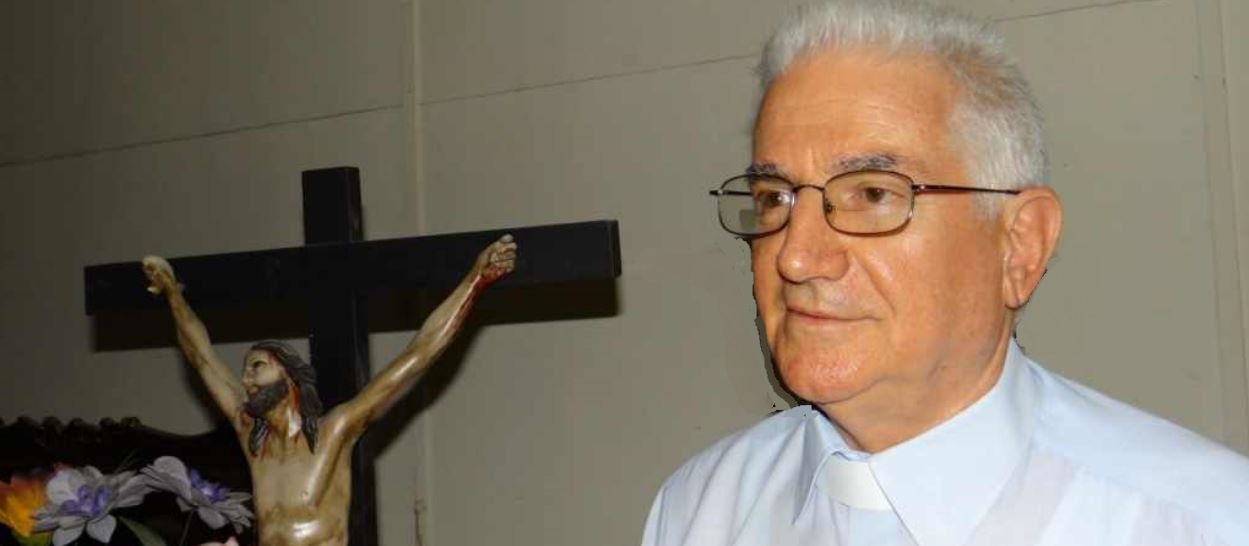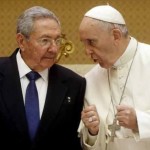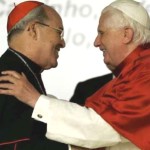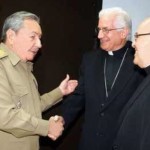
As papal visit nears, bishops’ letter stresses ‘mercy’ and ‘pardon’
On the occasion of Pope Francis’ visit to Cuba, Sept. 19-22, the Conference of Catholic Bishops of Cuba has issued a message to the Cuban people that the Communist Party daily Granma published Saturday (July 18) “at the request of the [Conference’s] presidency.”
The Conference’s president is Msgr. Dionisio Guillermo García Ibáñez (in photo at top), Archbishop of Santiago de Cuba, in photo above.
The subject of the message is mercy. And what makes its publication by Granma noteworthy is that the message has been in the Conference’s website since June 29.
“We all remember how we received Pope John Paul II, now a saint, as a ‘Messenger of Truth and Hope,'” the message says. “Pope Benedict XVI was among us the ‘Pilgrim of Charity.’ […] Now we prepare to receive Pope Francis as the ‘Missionary of Mercy.'”
“Mercy, dear ones, is nothing but ‘tossing our hearts’ to others, not a stone or an insult or a blow,” the message continues. It is also “putting a heart in misery. And there is so much misery around us! Sometimes it seems that we live in a world without a heart.
“Everywhere we find moral, spiritual, social, intellectual, psychical and material misery, and we also find people who are insensitive to human pain. […] Violence is on the surface of our skin. There is aggressiveness in families, work centers, communities, etc.”
Citing several Biblical instances of divine mercy, including the famous passage in Matthew 5:7, “Blessed are the merciful, for they shall obtain mercy,” the bishops point out that “all of us in this world, Cubans included, need mercy. […] There are people who do not forgive themselves for having committed an error, or do not forgive those who offended them.”
Jesus pardoned sinners and gave his pardon to those who crucified him, the message says, urging Cubans to “repeat gestures of mercy in our daily activities, such as visit the sick, share what we have, forgive and seek forgiveness, console the sad [and] love the others more and better.”
“To that effect, we Bishops of Cuba wish that, as an immediate preparation for the visit of Pope Francis, the first Fridays of July, August and September, [Cubans] carry out gestures of mercy for those who need them and set aside special times for prayer and fasting.”
The repeated use of the words “mercy” and “pardon” in the message could be interpreted as a subtle plea for a government pardon for deserving prison inmates. In December 2011, three months before the arrival in Cuba of Pope Benedict XVI, President Raúl Castro announced the pardon of 2,900 common prisoners who had “the potential for reintegration into Cuban society.”
In February 1998, one month after Pope John Paul II’s visit, the Cuban government released about 200 prison inmates.
During a radio interview in Spain last month, Cardinal Jaime Ortega y Alamino was asked if “some gestures” of clemency could be expected at the time of Pope Francis’ visit.
“Any internal gestures that might occur? Yes, internal gestures could occur,” Ortega answered, reminding his hostess that “when Pope Benedict went [to Cuba] there was a pardon for common prisoners.”
Cardinal Ortega and Archbishop García Ibáñez were instrumental in negotiations with President Raúl Castro that led to the pardons prior to Pope Benedict’s arrival.
The bishops’ message ends by asking for “God’s blessings for those who won’t be able to participate in the masses that Pope Francis celebrates in Cuba because they are either far from the homeland or for reasons of work, health or transportation, or because they are in prison.”





